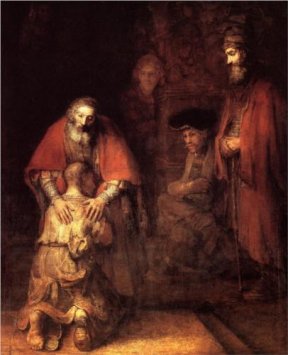
 HE PARABLE OF THE PRODIGAL SON is probably the most famous of all Jesus’ parables. It is so rich a story that exhausting its meaning would be difficult. One good way of approaching the parable is through its three characters. If we look closely, we should be able to recognize ourselves in the younger son, the elder son, and even in the father.
HE PARABLE OF THE PRODIGAL SON is probably the most famous of all Jesus’ parables. It is so rich a story that exhausting its meaning would be difficult. One good way of approaching the parable is through its three characters. If we look closely, we should be able to recognize ourselves in the younger son, the elder son, and even in the father.
Every one of us is the prodigal son. Whether or not we have ever become mired in a rebellious, downward spiral of grave sin, we all know the basic experience of separating ourselves from another. Sometimes we cut ourselves off from our parents or our children; sometimes we separate ourselves from spouses or old friends; sometimes we cut ties with God. We drift away into “a distant country,” until we eventually grow tired of our self-inflicted isolation and loneliness. By God’s mercy, we realize that we have forgotten our identity as His beloved children and finally wake up to His stupendous mercy.
There are also traces of the older son in us. Rather than wandering away, this son stays at home, yet he, too, becomes lost. This elder son is the type of person who did as he was told. He goes to work on time and does his job faithfully. He is an obedient and respectful son. Regardless of his dutifulness, though, his heart becomes calloused. He separates himself from his family not by fleeing to “a distant country,” but by walling up his heart, leaving himself imprisoned by unhappiness and resentfulness. When he sees his father’s joy at the return of his prodigal brother, he simply cannot abide it. His resentfulness reels when exposed to joy. This process is repeated in each of our hearts when we feel forgotten and unappreciated and we witness someone else being remembered and appreciated.
At different times in our lives, we have all played the part of these two singular, yet strikingly similar sons. The destiny of our lives, however, is not only to be the lost child who is found by the father. What St. Paul calls the “upward calling” of Christian life is the supernatural process of becoming the father.
In the father, we see an image of God, Himself, Who actively seeks out the lost and the broken. As much as we may feel separated from his love—either by our prodigality or by our sense of being overlooked—we never really are. The father loves both of his sons equally, and there is nothing at all they can do or say that will actually separate them from his love. This father demonstrates spendthrift generosity by going out to meet each of his sons in their need and welcoming them back with heartfelt joy. Every Christian must imitate that example. In all the relationships of our lives, especially the difficult ones, the challenge of Christianity is to love with the same balance and effusiveness as God the Father.
At the heart of this tremendous parable is reconciliation. We, ourselves, first require reconciliation with God, and we are subsequently charged with the imperative to work toward reconciliation with our neighbors. In the words of St. Paul, God “has reconciled us to Himself through Christ and given us the ministry of reconciliation. . . . We implore you on behalf of Christ, be reconciled to God.” Reconciliation means not separating ourselves, like the two sons do. Rather, it means imitating the father by removing obstacles and restoring relationships.
Through prayer, it is possible to recognize the ways in which we resemble the younger and elder sons. Also through prayer, it is possible to chart our progress on the path toward becoming the father. Only when we engage all three perspectives within this parable will we be able to comprehend its marvelous message of mercy.
